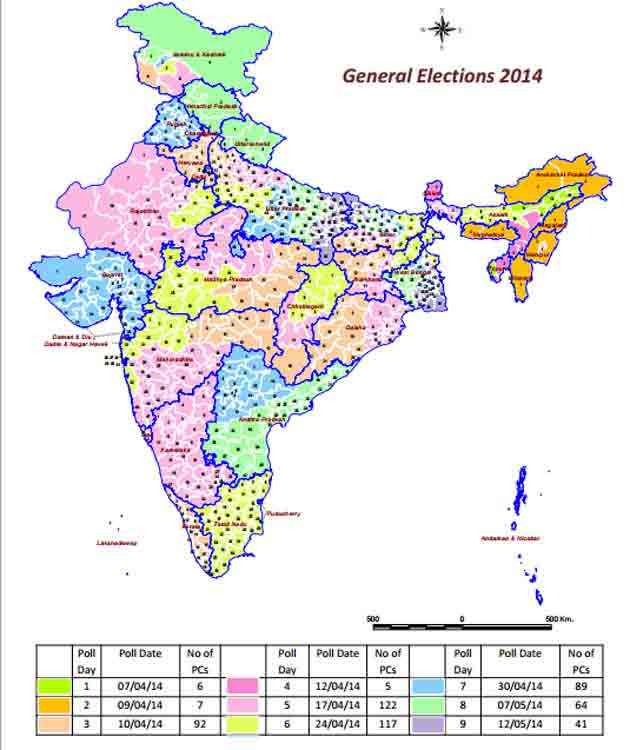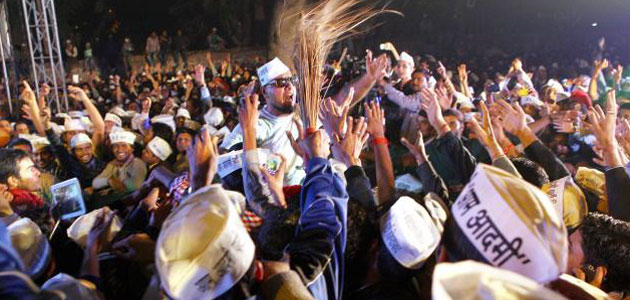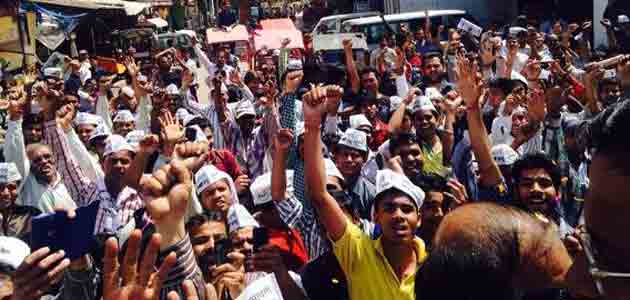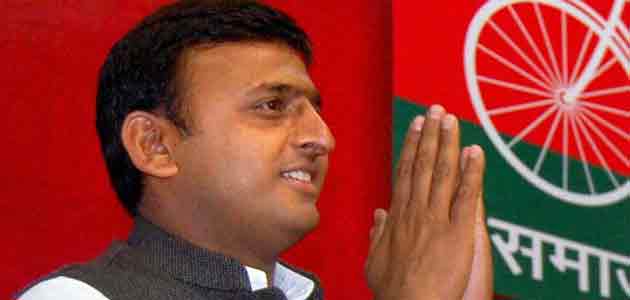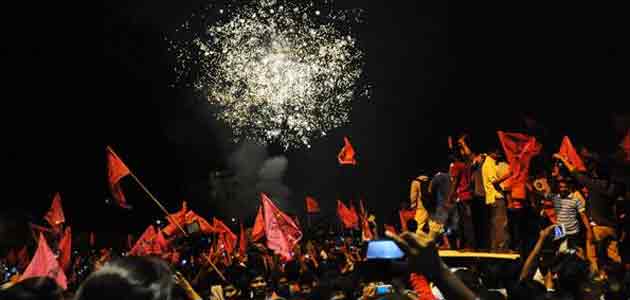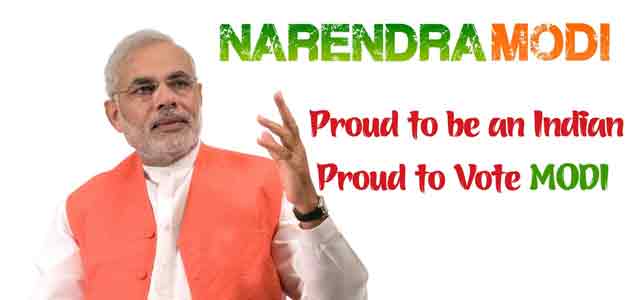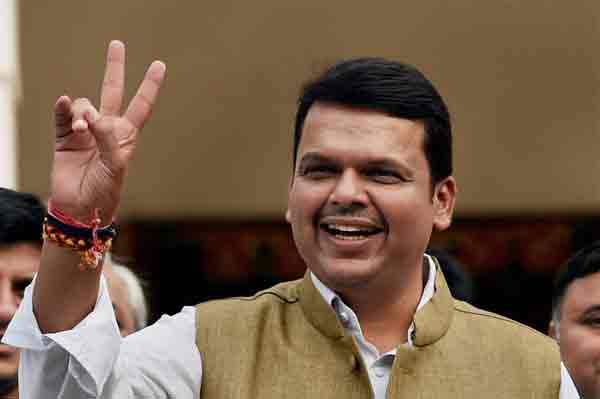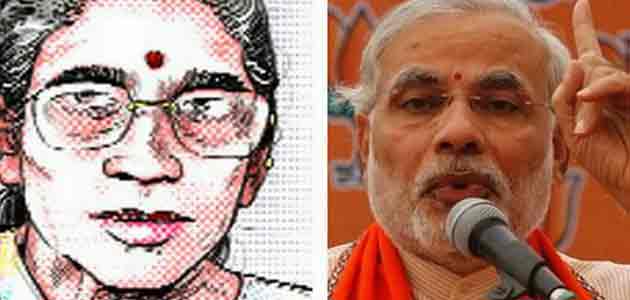
Their destination was Brahmanwada, about 50km from Vadnagar, where the bride, Jashoda, lived. Her father, Chimanlal Modi, was a school teacher. When the groom’s party reached Brahmanwada, Narendra was made to sit on a horse. “He looked good,” says Punja Patel, 75, who attended the function. Patel, however, remembers the wedding for another incident – a patharnu (thick cotton sheet on which people sit), he had given to the Modis, went missing from the venue.
Narendra’s friends say he was reluctant to get married. “He was engaged to Jashoda a year before the marriage. But unlike other teenagers, he never spoke about her. In fact, he kept telling us that he wanted to serve the country and was not interested in marriage,” says Nagji Desai, 64, an ayurvedic practitioner who was a classmate at Shri B.N. High School in Vadnagar.
The wedding was a simple affair. “When we reached, we were offered tea, gathiya and jalebi,” says Desai. Though Narendra remained serious throughout the function, Jashoda, who was one and a half years younger than the groom, appeared happy. Desai says she wore a red panetar (a traditional Gujarati sari) and a green modiyu (an ornament that Gujarati brides wear on the forehead). Lunch was served after the wedding. Desai still remembers it had mohanthaal (a sweet dish), puri, vegetable, dal and rice.
Jashoda left her home with Narendra for Vadnagar, where his mother welcomed them by applying kumkum (vermilion) on their foreheads, says Desai. A relative performed the ritual of untying the knot of a cloth the couple had worn on their shoulders. Then they played a game in which they were asked to find a ring in a container of milk and flowers. The one who finds the ring, it was said, would rule the marriage. “Narendra won,” says Desai, though it still appeared to be a happy day for Jashoda.
The next dawn, however, broke with a shocking news. “Narendra took the 6 a.m. train to Ahmedabad,” says Desai. “He returned only after some 30 years.”
It came as a shock to Narendra’s friends, too, as he had not told them about the plan. “He gave in to parental pressure to get married,” says Jasud Khan Pathan, 64, a retired bank manager who was also a classmate at Shri B.N. High School. “That he has been married is true. But the fact is that they never lived together.”
According to Desai, Jashoda went to her parents’ home after a few days, which was customary. When she returned to Vadnagar, Narendra’s parents were said to have told her that she could stay with them as long as she wanted to. It is said that she stayed at the in-laws’ place for a few months and went back home. She continued her studies as her husband had asked her to and became a school teacher. Now retired, she lives with her brother Ashok and sister-in-law in Unjha near Vadnagar.
It was a controversy in waiting. No sooner Narendra Damodardas Modi, the BJP’s prime ministerial candidate, acknowledged in his affidavit while filing nomination papers from the Vadodara Lok Sabha constituency that he was married than the media rushed to Unjha in search of Jashodaben. They were told that she had gone on a Char Dham pilgrimage, and would be back only on May 17, a day after the Lok Sabha election results are scheduled to be announced. Ashok, however, later said she was back.
It could be the fear of offending the powerful man (undoubtedly, Modi revealed his marital status in the affidavit only because there was a Supreme Court directive against leaving any column blank), Jashodaben’s family is reluctant to answer any questions about the Gujarat chief minister. And the irony is unmistakable. While Modi, who enjoys Z-category security owing to a terror threat, is seldom asked about his wife, Jashodaben and family remain open to questioning by society and the media. While Modi and his party are spending hundreds of crores of rupees for media slots, Jashodaben and family are struggling to avoid attention. “My sister-in-law has no problems with him [Modi]; then what do we say?” asks Ashok’s wife.
Ashok, who runs a small business, says Modi had his reasons not to admit that he was married. “Since he was a pracharak [of the Rashtriya Swayamsevak Sangh] he could not disclose his wife’s name; but he always had feelings and now he has expressed his feelings by naming her in the affidavit,” he says. Has Modi ever provided any kind of support to her or the family because of his “feelings”? “The family did not need help and she was a teacher,” says Ashok, confirming that the couple never had a married life, as Modi left home soon after their wedding.
Kamlesh Modi, Jashodaben’s youngest brother who lives in Brahmanwada, is even more elusive. All that he says is that they are proud that Modi is from Mehsana district.
The extended family, however, is not so closed. Daksha Modi, who is married to a nephew of Jashodaben, Rakesh, is seemingly angry. “After Modi acknowledged my aunt as his wife, his elder brother Sombhai described the marriage as aupcharikta (formality). What is formality?” she asks. “At times, we tell her to go to Gandhinagar. But she says, ‘What is the need? I get my pension’.”
According to Daksha, Jashodaben regularly follows Modi on television and in the newspapers, and prays for him to become the prime minister. She does not like anyone criticising him. Daksha is sure that Jashodaben will not say a word against Modi even if she is offered a fortune.
Modi’s family has clearly moved on from the marriage. Prahlad Modi, one of his brothers, says only Sombhai, the eldest brother, will answer questions on Modi and Jashodaben. Sombhai had earlier said the marriage was just a formality and requested everyone not to view it based on his brother’s current status but on the poor financial conditions and orthodox nature of the family. When contacted by THE WEEK, he said he was travelling.
Whenever he talks about Modi, Prahlad never fails to mention how the family struggled in the earlier days and their mother, Hiraba, used to do chores in other houses to educate them. He is proud of what Modi has achieved, and he does not seem to believe that his brother owes it to anyone, not least to a wife whom he left a day after the wedding.
April to September is pilgrim season in north India, when the faithful from across the country flock to the Char Dham in the Himalayas. For devotees from Gujarat, the journey this year offers not just spiritual bliss but also a fair share of intrigue. There are whispers that one of the ashrams of yoga guru Baba Ramdev near the Neelkanth Mahadev temple in Rishikesh in Uttarakhand is hosting Jashodaben until the elections are over and the media interest in her wanes.
According to sources in the Vishva Hindu Parishad, soon after Modi acknowledged Jashodaben as his wife, Hindu activists and security professionals dressed as pilgrims arrived on her doorsteps in three white SUVs. They told her that her long-standing wish for a Char Dham yatra had come true. Sources said the group took her to Ahmedabad, where she boarded a chartered flight to Aurangabad near the Uttar Pradesh-Uttarakhand border, and then to Ramdev’s isolated mountain-top ashram at Rishikesh. Labourers in the ashram say a lady was seen arriving in a white vehicle on April 13.
“Jashodaben is protected by top-level security people with ties with the Gujarat security services. Perhaps, she does not even know that those with her are not pilgrims but people tasked with keeping her away from the public eye,” said a source close to Swami Swaroopanand Saraswati, the Shankaracharya of Dwarka Peeth, who recently spoke out against Modi.
Despite Jashodaben’s vanishing act, the atmosphere at her brother Kamlesh’s home is upbeat. Strangers and unemployed youth are pouring in to meet Jashodaben and inquire about her famous husband. Modi’s acknowledgement has put the spotlight on her relatives and they seem to be enjoying it. Jay, Kamlesh’s 16-year-old-son, says he wants to follow in the footsteps of his fuva (paternal aunt’s husband). “I want to fight elections and be a politician,” he says. “Jashodaben thinks of me as her favourite. She always insists on meeting me twice a day.”
The worlds of Modi and his in-laws are poles apart. Kamlesh’s home is no lap of luxury and his wife, Sitaben, does not wear designer clothes. She receives guests in a small room with two charpoys and overhanging steel buckets. It is evident that she and Jashodaben have had hard lives.
Sitaben, however, is a firm supporter of Modi. She is wary of Congressmen, who in the past had exhorted Jashodaben to speak out against Modi. “Do not criticise Modiji,” says Sitaben. “He has sacrificed a lot for the country. We don’t blame him for neglecting his wife.”
Detractors, however, say Modi left his wife in the lurch. “A primary school teacher in Gujarat earns approximately Rs 15,000. In the 1970s, the salaries were much lower and her life must have been full of hardship,” said Madhusudan Mistry of the Congress, who is contesting against Modi in Vadodara.
Despite the controversy, political parties seem unwilling to reach out to Jashodaben. Perhaps, they fear that if they did, she would come out in support of Modi. Shabnam Hashmi of the NGO Act Now for Harmony and Democracy says Jashodaben’s public image as a religious and conservative woman will be used to bolster the kind of womanhood that fits the RSS ideology well.
Despite all the media attention, very little is known about Jashodaben. The many photos of Hindu deities that crowd the walls of Kamlesh’s house indicate that she is as religious as her relatives. Students of the Rajosana Primary School near Brahmanwada, from where she retired in 2010, recall an affectionate and popular teacher who used to teach social sciences, elementary maths and Gujarati language. School photographs show her surrounded by students, most of them Muslim, and villagers speak of her in tones bordering on reverence. “She used to rise very early and feed the cows chapattis and jaggery before leaving for school,” said a villager. “She was very religious but was fond of all her students, irrespective of their differences.”
Modi’s yatra
September 17, 1950: Born in Vadnagar, 100km north of Ahmedabad.
1950-60s: Attends schools in Vadnagar and Ahmedabad. Works at a tea stall in Ahmedabad.
1968: Marries Jashodaben, but leaves to join the RSS. Starts living at the RSS headquarters in Maninagar.
1970s: Jashodaben clears SSC exam in 1974, completes teachers’ training in 1976 and starts teaching two years later.
1987: Modi joins the BJP. The party wins the civic body polls and Modi becomes general secretary of the state unit within a year.
1990: Plays a vital role in L.K. Advani’s Rath Yatra.
1995: The BJP wins Assembly polls for the first time in Gujarat. Senior leader Shankersinh Vaghela rebels and splits the party within six months.
1998: Mid-term Assembly polls held and the BJP regains power. Modi made organising secretary of the BJP.
2001: Persuades central leadership to replace chief minister Keshubhai Patel. Modi becomes chief minister.
2002: Riots break out after Hindu pilgrims die in a train fire in Godhra. At least 1,200 people killed. Prime Minister A.B. Vajpayee suggests sacking Modi, but Advani and Arun Jaitley save his chair. Victory for the BJP in Assembly polls.
2005: The US denies visa to Modi.
2007: Leads the BJP to another Assembly election victory in Gujarat.
2008: Persuades Tata to relocate its Nano project to Gujarat.
2009: The Supreme Court asks the special investigation team (SIT) to examine his role in the Gulbarg Society massacre.
2010: The SIT grills Modi. The CBI arrests his trusted aide Amit Shah in the Sohrabuddin fake encounter case. Jashodaben retires as teacher.
2011: Gets a clean chit from the SIT and starts Sadbhavna fast.
2012: The UK ends boycott of Modi and the European Union follows suit in a few months. Third victory in Assembly polls.
June 2013: Appointed the BJP’s campaign committee chief for the Lok Sabha polls.
July 2013: CBI report says Ishrat Jehan encounter was fake.
Sept 2013: Named the BJP’s prime minister candidate.
April 10, 2014: Mentions Jashodaben as wife for the first time in poll affidavit.
The article was first published on The Week.


